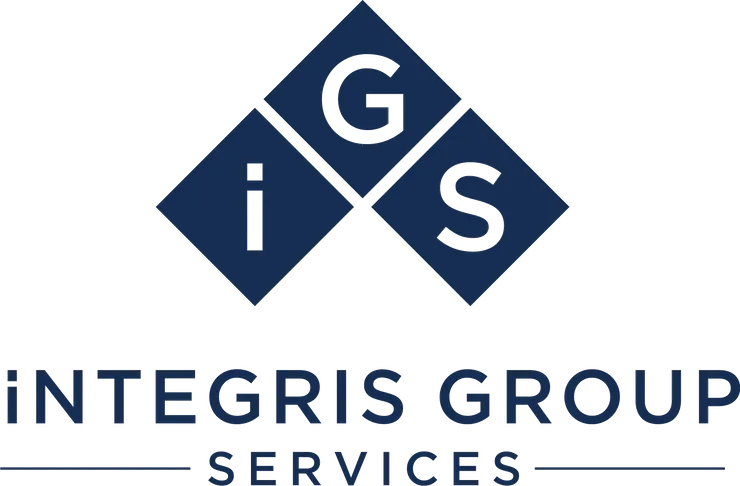What is Technical Writing
Technical writing is the craft of producing clear, concise, and structured documentation that transforms complex ideas into accessible information. It bridges the gap between technical experts and the people who need to apply that expertise — whether they are frontline workers, leadership teams, auditors, or external regulators.
At its core, technical writing involves:
Explaining complex concepts clearly
Structuring information so that it is easy to navigate and use
Tailoring content for specific audiences and regulatory requirements
Common examples of technical documentation include:
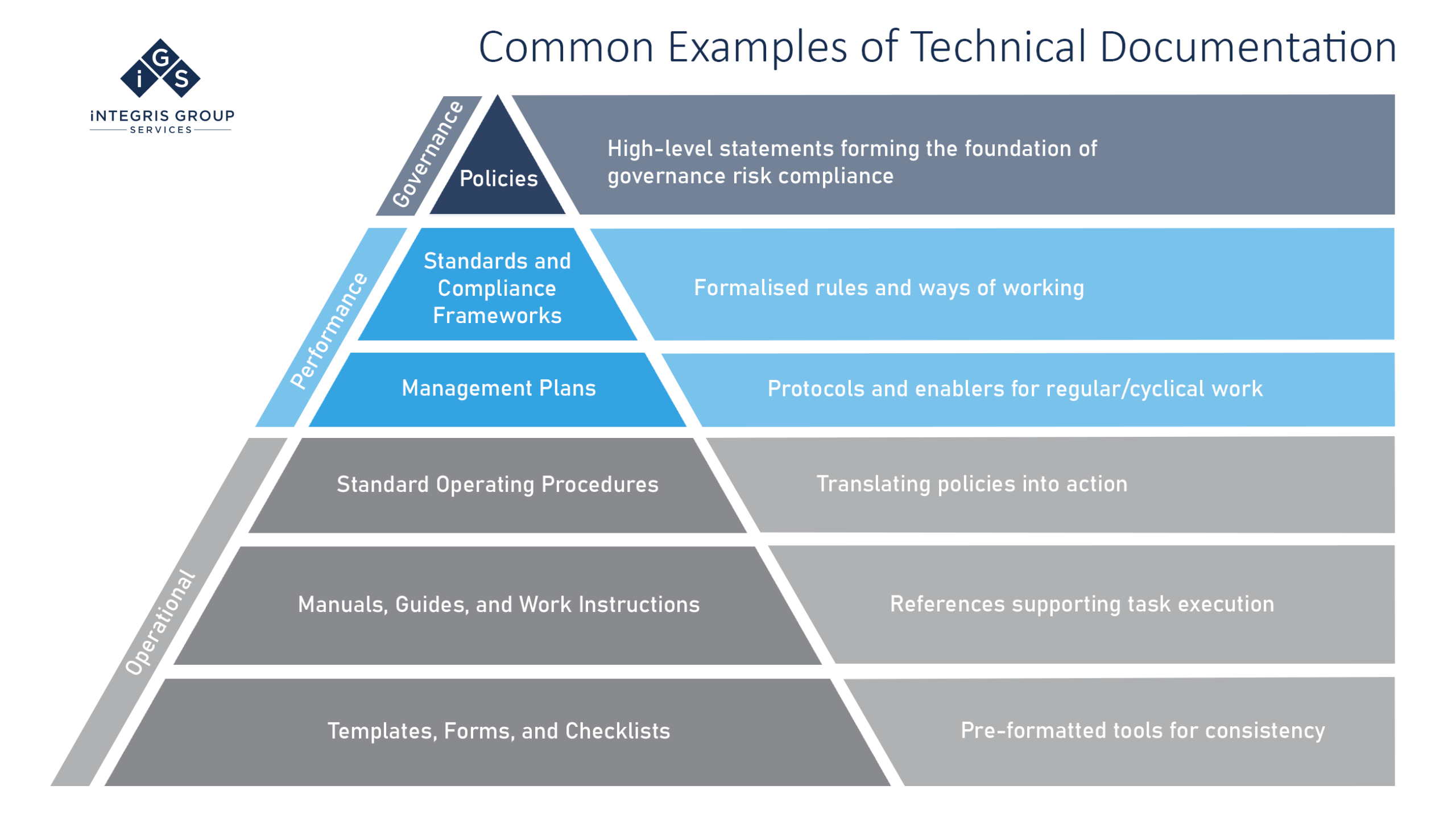
- Policies – High-level statements that define an organisation’s position, intent, and guiding principles on key issues, forming the foundation for decisions and actions.
- Standards and Compliance Frameworks – Formalised rules ensuring alignment with industry, legal, or regulatory requirements [1].
- Management Plans – Documents outlining hazard controls and strategies to manage operational risks.
- Procedures – Detailed, practical steps that translate policies and plans into routine actions for safe, consistent, and compliant operations.
- Manuals, Guides, and Work Instructions – Step-by-step references supporting task execution and system use.
- Templates, Forms, and Checklists – Pre-formatted tools that streamline documentation, data capture, and consistency.
Effective technical writing is not simply about “writing things down.” It is about ensuring that your documentation works as intended for its target audience — helping people understand, apply, and comply with the information the document provides to enable the layers of the organisation to deliver their vision and strategy.
Why Does Technical Writing Matter?

When technical documentation is clear and well-structured, your organisation benefits from:
Reduced operational errors and rework
Improved compliance and audit readiness
Time savings through faster onboarding and easier access to knowledge
Knowledge retention that is not dependent on individual SMEs
Conversely, poor documentation leads to confusion, frustration, non-compliance, and increased risk exposure [2].
Learn how we supported the Department of Energy, Environment, and Climate Action (DEECA) to develop efficient processes and documentation.
The Common Myth: Anyone Can Be a Technical Writer
One of the most damaging misconceptions in documentation projects is the belief that any good writer can be a technical writer — or that subject matter experts can simply “write it themselves.”
In reality, good technical writing requires key skills that are typically not transferable. Good technical writers have a base understanding and tailor content to the user’s needs using clear structure-based guidance to ensure it’s easy to follow and apply.
What Technical Writers should focus on:
Without these three considerations, even well-intentioned documentation efforts can fail to deliver usable outcomes:
Why Not All Technical Writers Are Created Equal
When assessing the capability of a technical writer, it is best to use the following key three factors to determine their true capability:
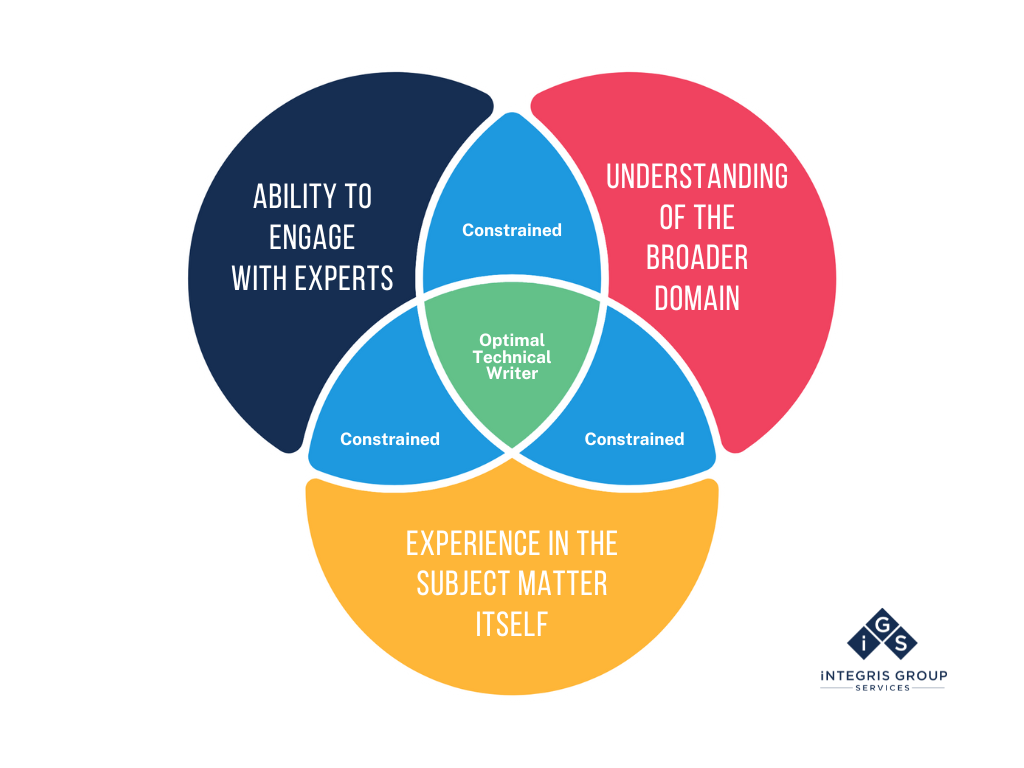
When writers have both subject matter expertise and an understanding of the operational environment, they add immediate value by asking the right questions, identifying gaps others may miss, and anticipating user needs. This enables them to collaborate effectively with SMEs and stakeholders, streamline feedback cycles, and produce accurate, user-ready documentation faster, therefore reducing delays, revisions, and miscommunication.
How the Presence of Key Factors Influence Delivery Performance
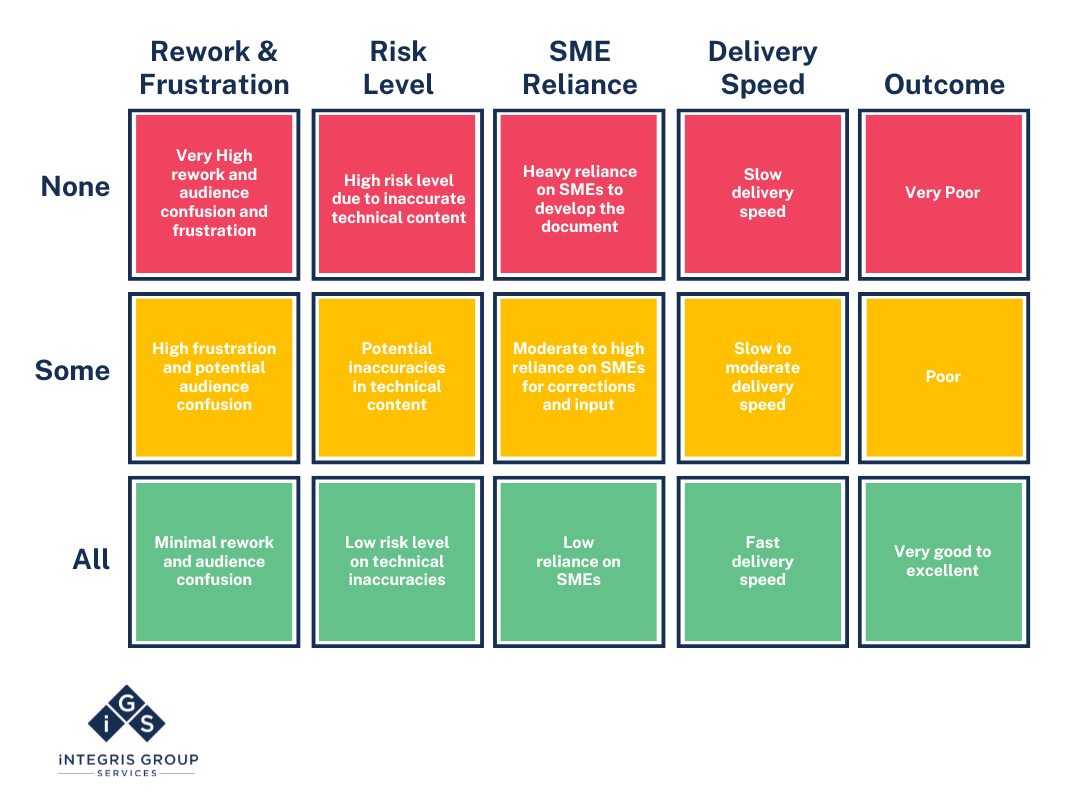
When only one or none are present, delivery is high-risk and often chaotic. With two, delivery becomes more feasible, though it tends to be slower and heavily reliant on SMEs. But when all three are in place, writers are well-supported. This accelerates delivery, reduce rework, and minimise frustration risk [4].
If you would like an assessment framework, please click here to connect with us.
Process Matters: How Effective Technical Writing Relies on Structure
Great technical writing is not just about who does the work, rather it’s about how the work gets done. This includes how the moments to engagement with experts is determined, how content is developed, and what consultation is needed [3].
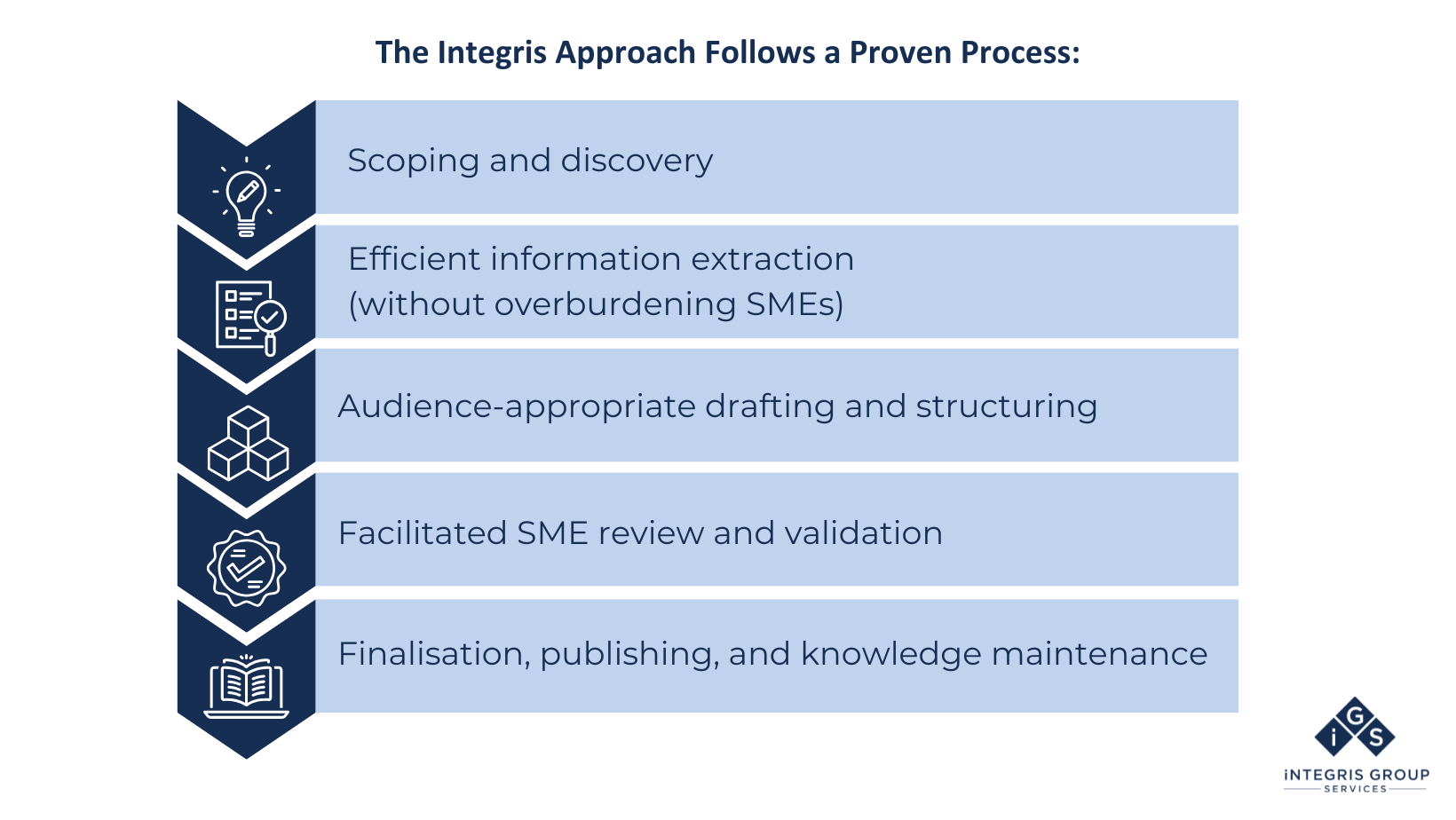
This structured approach ensures that documentation is fully aligned with your operational needs, and accurately reflects their subject matter expertise through validation. Consultation enables the tailoring of content for practical use and understanding by the intended audience, frontline staff, supervisors, managers, or leadership. Each stage of the process should add value to the content ensuring that it is correct as well as making it also also usable and sustainable within your organisation.
Flexible Processes Across Document Types and Audiences

Good Technical Writers understand that not all documentation is the same and neither are the audiences who read, follow or rely on them. At Integris Group Services, we tailor our Service Delivery Approach to suit varying audience levels, requirements and organisational focus, including:
Executive-level policy writing
These documents are crafted to support strategic oversight, risk management, and clear lines of accountability. They help Boards and Executive teams make informed decisions by articulating organisational intent, boundaries of authority, and compliance obligations in plain, structured language.
Compliance standards and frameworks
These include detailed documentation that aligns operations with industry regulations, legislative requirements, and internal policies. Our writers ensure traceability, version control, and clarity so the organisation can demonstrate conformance and respond confidently to audits or regulatory inquiries.
Strategic management plans
These provide structured direction for achieving operational, strategic, or program-specific goals. These documents define objectives, outline responsibilities, allocate resources, and identify risk controls—ensuring coordinated action across teams. Whether for projects, facilities, workforce, or service delivery, Management Plans guide consistent execution, enable compliance, and support performance monitoring.
Operational procedures and instructions
Targeted at frontline staff and supervisors, these documents translate policy into actionable steps. They are written to be clear, practical, and easy to follow, enabling teams to perform tasks correctly, consistently, and safely — even in high-risk or high-compliance environments
User-friendly manuals and training guides
Designed to support learning, these resources explain systems, tools, and workflows in a way that empowers users to build capability and confidence. Whether it’s new employee onboarding or just-in-time task support, the focus is on accessibility, visual clarity, and ease of use.
Forms and templates
Used by frontline teams and supervisors, these documents standardise how information is captured, actions are requested, and processes are recorded. They promote consistency, accuracy, and compliance across day-to-day operations.
This adaptability ensures that the documentation achieves its purpose: enabling action, understanding, and compliance.
Technical Writing Lightens the Load of SMEs

Your Subject Matter Experts (SMEs) are highly skilled, but their time is limited. A good technical writer can support them by:
Facilitating productive, respectful engagement to extract key information
Doing the research to reduce time wasted on clarifying key drivers, terminology and acronymns
Bring structure and process to the drafting and review cycle
Deliver fit-for-purpose outputs with minimal friction
See how Integris helped a compliance regulator streamline documentation delivery while protecting SME capacity.
Why Integris Group Services?
The success of any documentation project depends not just on what gets delivered, but on how it’s delivered and who you trust to deliver it. At Integris, we take that responsibility seriously.
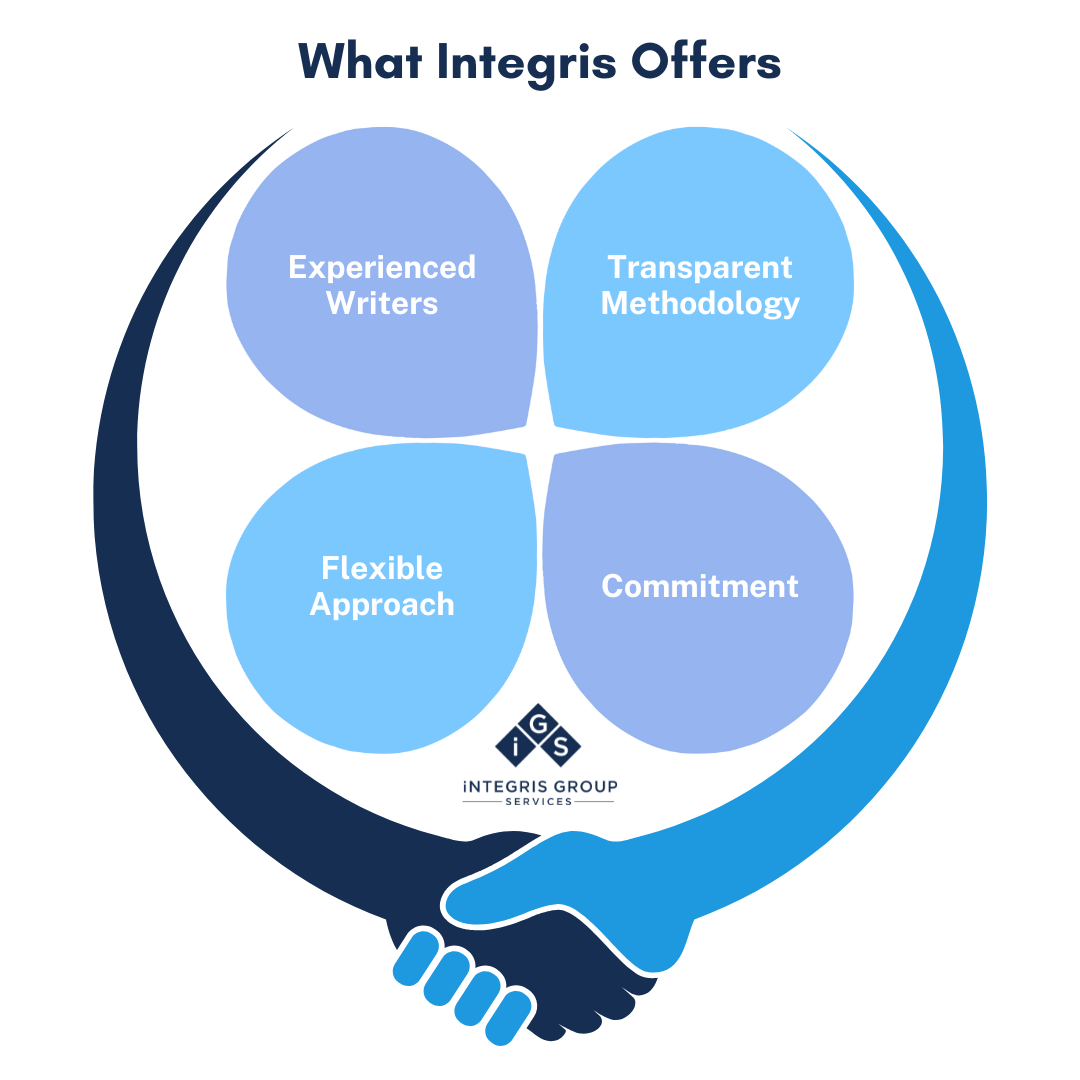
Choosing Integris means choosing a partner who brings:
- Experienced writers with both domain understanding and writing expertise,
- A repeatable, transparent methodology,
- A commitment to reducing SME burden and accelerating delivery, and
- A flexible approach based on your needs.
Our mission is to make complex information clear, usable, and impactful — so your people can focus on what they do best.
Get Technical Writing Right the First Time
Technical writing done well is not an overhead. It is an enabler of safety, compliance, and operational efficiency [1].
No matter who you choose to develop your documentation, it’s critical you ensure it works for your people.
Ready to transform your documentation into a strategic asset?
Unlock the full value of your documentation. Let’s make it work harder for you.
